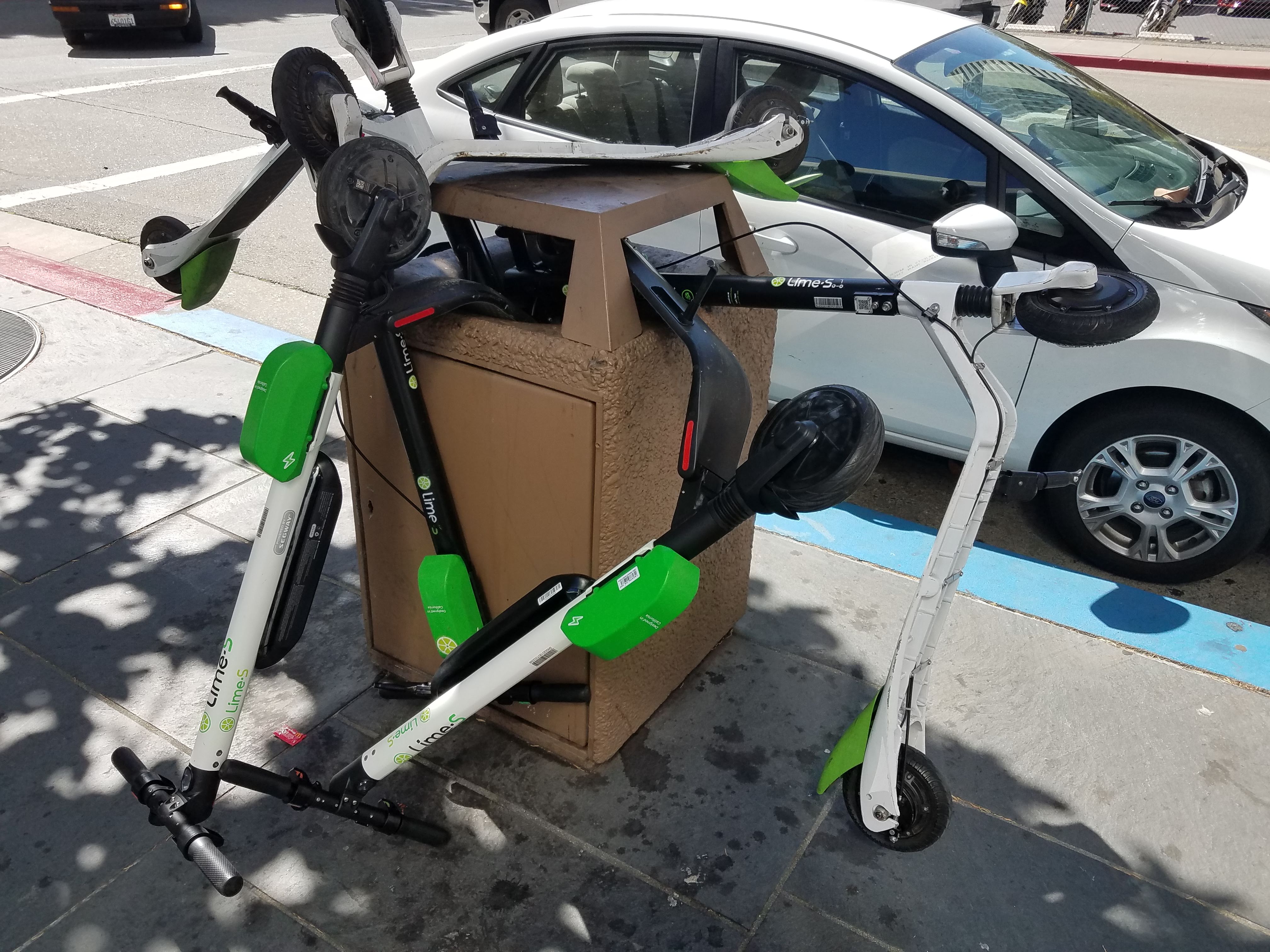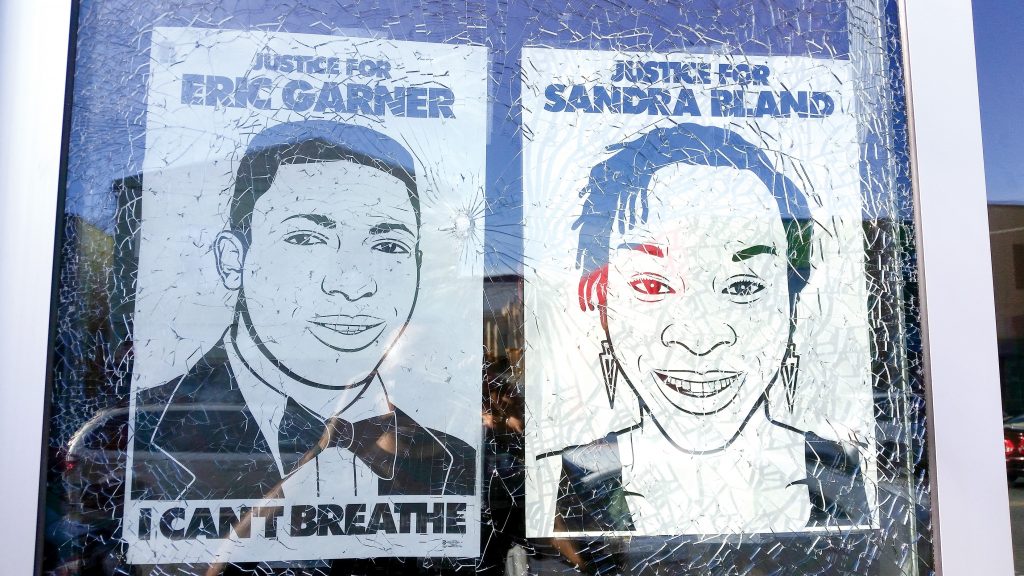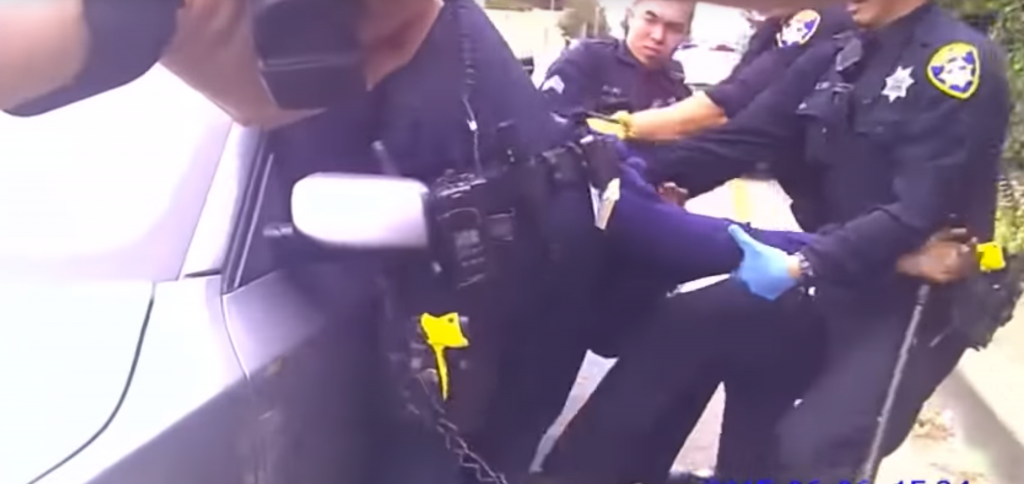Downtown Oakland is flush with electric scooters. Rented through a smartphone app, the scooters have become ubiquitous on city streets. Teenagers ride them — sometimes on the wrong side of the road — to West Oakland or Bay Street in Emeryville. Commuters weave through rush-hour traffic.
The scooters cost $1 to unlock by scanning a QR code on the handlebar using a smartphone app. After that, the app tracks the time and distance traveled, charging a rate of 15 cents per minute or $9 per hour. The scooters can go nearly 15 mph for 20 miles or more. When they need recharging, the companies use independent contractors to collect and charge the scooters for $10 to $15 apiece.
While they’re a quick and accessible form of transportation, the scooters are also being criticized for creating a nuisance and safety hazard, as well as for symbolizing the brazen nature of the tech industry. Some of the two-wheelers have been tossed into Lake Merritt.
Scooters began appearing in cities across the country earlier this year. In Oakland and San Francisco, the two companies primarily operating them are Lime and Bird.
According to the companies’ websites, Lime operates in 85 U.S. cities and six in Europe as well as on 19 college campuses. Bird is in 32 cities in the United States as well as Paris.
Lime was the first to arrive in Oakland. It was founded as a bike share company in January 2017 by Toby Sun, Brad Bao, Charlie Gao, and Adam Zhang. Sun and Bao both attended college in China, earned master’s degrees in business at UC Berkeley, and worked at venture capital firm Kinzon Capital before founding Lime. Zhang manages Lime’s China office.
According to city records, Lime reached out to city officials in February to inquire about introducing scooters in Oakland. The city staff told the company that there was no existing permit program for such a service, but recommended applying for a business license and cautioned against violating city regulations such as obstructing the right of way and illegal dumping. In March, Lime launched in Oakland with 40 scooters.
Meanwhile, the scooters also appeared in San Francisco, sparking outrage among some residents. Eventually, the board of supervisors banned unpermitted scooters effective June 4, and the city’s Metropolitan Transportation Commission created a permit application process. Twelve companies applied for five available permits to provide scooter service in San Francisco. Once the permits are approved, the total number of scooters allowed in San Francisco will be capped at 1,250 for the first six months.
After San Francisco clamped down on scooters, Bird brought its scooters to Oakland, but didn’t coordinate its rollout with the city government.
Bird was founded a few months after Lime by Travis VanderZanden, a former executive at Uber and COO of Lyft. Like Uber and Lyft, Bird’s tactic appears to be to begin operating in a city before seeking permission or reaching out to city leaders. Santa Monica filed a criminal complaint against Bird after it began operating without permission last year. The company pleaded no contest to the charge in February, agreeing to pay over $300,000 in fines and other costs.
On June 22, Marlo Sandler, Bird’s senior manager for government relations, sent an introductory email to members of the Oakland City Council. “I am reaching out on behalf of Bird to say hello and introduce the company,” she wrote. “You may have seen that we’ve begun a small demonstration pilot of our electric, shared-use scooter service in Oakland, primarily concentrated downtown along Broadway.”
City Councilmember Abel Guillen responded swiftly. “You have no permits for these in the city and they are causing many complaints,” he wrote. “Please refrain from encroaching on the public right of way until you are permitted.”
But Bird has continued operations in Oakland and has dozens of scooters spread out across the city, primarily concentrated in downtown. Like in San Francisco, the sudden appearance of the scooters has raised concerns about the safety of riders and pedestrians as well as the obstruction of sidewalks and dumping in the lake.
Oakland city leaders started working on a permit process, but have so far stopped short of an interim ban like in San Francisco.
“My hope is that we won’t have to go through an interim ban; we’ll just go ahead with implementing permits and regulations for responsible behavior,” said City Councilmember Rebecca Kaplan, who has been working on drafting an ordinance to regulate the scooters. The council passed a draft version in July, but the city’s Bicycle and Pedestrian Advisory Commission was scheduled to make recommendations at its August meeting before the council takes up the issue again in September.
The draft ordinance would allow the city administrator to set a cap on the scooter company’s fleet size but does not specify what that cap would be. The companies would be required to provide a 24-hour customer service line for complaints about improper parking and address those complaints within three hours during business hours and within 12 hours on nights and weekends. If the company is consistently out of compliance, the city administrator could reduce its fleet size or revoke its permit altogether.
The ordinance would also require half of the scooters to be deployed in low-income neighborhoods and offer a low-income reduced price option. It prohibits the companies from having the scooters play threatening messages. (Lime’s scooters used to loudly announce that the police would be called if someone fiddled with or stood on them without paying.)
Future revisions could also include speed limits for the scooters, but Kaplan said she is not considering a cap on the number of companies that can operate scooters like San Francisco. “It’s better for the public if there’s some competition,” she said. “If we have strict rules for how they have to behave, and if a company misbehaves, they can have their permit taken away.”
Lime did not respond to requests for comment about the proposed regulations by deadline. A spokesperson for Bird declined to be interviewed by phone and instead provided vague written responses to questions about the company’s rollout in Oakland and reaction to specific proposed regulations. Asked about how many scooters it introduced in Oakland and whether it coordinated with city officials, the company said, “When we go into each market, we look at the community’s needs to make sure supply meets demand,” adding that it would make sure each scooter averaged three rides per day before introducing more.
Asked about specific proposals in the Oakland draft ordinance, the company stated, “Bird has had productive conversations with city officials throughout the process of developing the ordinance.”
At the July 24 Oakland City Council meeting, Guillen, who tested the scooters earlier that day, said he believes the ordinance needs more attention to safety. But Bird has been trying to relax state safety regulations. The company sponsored a bill in the state Assembly in February that would permit adults to ride the scooters without a helmet. An earlier version of the bill would have allowed the scooters to be operated on sidewalks.
So far, the safety of electric scooters is not well studied, and the Oakland Police Department does not track scooter-related accidents. McGee, Lerer & Associates, a personal injury law firm in Santa Monica, said the most common call the firm has received regarding scooters is injuries resulting from a malfunctioning Lime or Bird scooter, such as issues with the brakes, tires, or handlebars. The firm said it has also received complaints about pedestrians being hit on the sidewalk or scooter riders crashing after hitting a pothole or fallen debris.
And while many Oaklanders seem to be enjoying the scooters on the city streets, the comments the city council heard at the July 24 meeting were mostly negative.
“I see people speeding up and down our city streets all over the city of Oakland,” said Cathy Leonard, founder of Oakland Neighborhoods for Equity. “These bikes are out of control and nobody is doing anything about it. I want these bikes off of city streets.”


